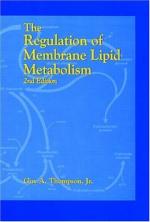|
This section contains 766 words (approx. 3 pages at 300 words per page) |

|
The lipids are one of four major families of biochemical compounds, the other three being carbohydrates, proteins, and nucleic acids. Biochemical compounds are organic (carbon-containing) compounds that occur in living organisms. The lipids are unique among organic and biochemical families because of the way in which they are classified. In all other families, members are categorized because of similar chemical structure and similar chemical properties. Lipids are characterized instead on the basis of a single physical property, their solubility. Lipids tend to be insoluble in water, but soluble in certain organic solvents such as benzene, chloroform and ether. The lipid family contains, therefore, a rather wide range of compounds that are structurally quite different from each other. The members of the family are often divided into four subcategories: (1) the simple lipids, (2) the compound lipids, (3) the steroids, and (4) the terpenes.
The simple lipids include waxes, fats, and oils. These...
|
This section contains 766 words (approx. 3 pages at 300 words per page) |

|


